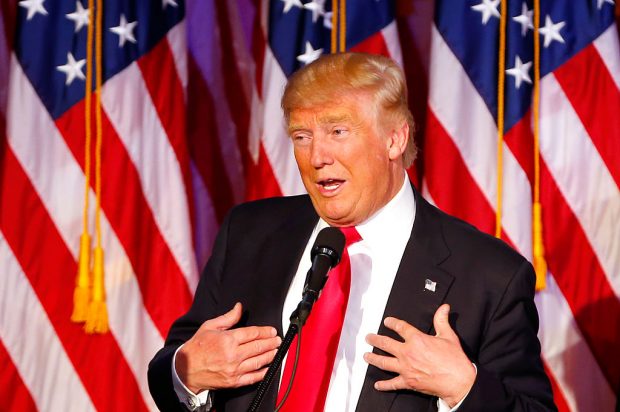Most commentators see Donald Trump’s election as a stiff middle finger to the elites, and a rejection of the neoliberal economics that’s left the working class behind. Others believe it’s because Trump is a TV star, and celebrity impresses low-information voters more than competence (or facts). Whatever. The bottom line is that Americans have fallen for a con-man, and not even a subtle one. (‘It’s going to be tremendous…a beautiful, beautiful thing’, Trump would say routinely on the stump, about almost anything, like a third-rate timeshare salesman.) Any change is good change, these millions feel, so Trump is worth a try.
Worth a try. Strange indeed that we’re talking about the leader of the free world, but Obama himself carries some of the blame. Swept to power in 2008 on an extraordinary promise of hope (remember the posters?) he has failed to deliver. Much of this is not his fault of course—the obstructionism of the Republican-controlled Congress, with barely-concealed contempt for the first black president never far beneath the surface, has rendered his administration pretty much impotent since the 2010 mid-term elections. And while people seem to recognise this—the popularity of gridlocked Congress is at an all-time low, while Obama’s is as high as it’s ever been—voters don’t seem to give him, or his party, much of a break. At the end of the day, Obama has not been able to deliver much, if any, improvement to the low-income neighbourhoods (white and non-white) which have been ravaged for years by unemployment, opioid addiction and the petty crime that feeds off economic despair.
So Trump is, they feel, worth a try: because surely anything is better than the status quo. If global free trade is the culprit (and it’s objectively undeniable that jobs have been lost from America to lower-wage economies) then why not try protectionism? It’s been forcefully argued that this will end in tears for the American working class—from raising prices on consumer goods (how do they think a giant plasma-screen TV can cost so little?) to directly killing the jobs the populists claim they to want to save (Trump has mooted tariffs on Japanese cars, most of which are made in places like Ohio and Indiana by American autoworkers). But it sounds good and comforting—doesn’t it?—to imagine a return to the ‘Made in America’ greatness of the 1950s post-war boom.
You don’t have to be a Chicago-school economist to see that re-importing developing-world jobs to America (or for that matter France or Britain) is unlikely to be the one-way ticket to prosperity its promoters claim. Trump knows this, of course: his stance on global trade is like his opposition to abortion and gay rights, and even the deportation of illegal immigrants—he doesn’t believe a word of it and won’t follow through in office. (I will eat my sombrero if a single brick is laid in his much-vaunted wall along the Mexican border). The question will become how those that supported him will respond to the abandonment of these positions. I expect the answer to be ‘quite reasonably’, since they weren’t all that interested in his positions in the first place—more in his anti-establishment persona. Change for its own sake.
And that Trump can offer. Like a defeated football manager we can, and must, ‘look for the positives’ in what is, on the face of it, an unpromising (OK frightening) situation. Trump is not beholden to the Republican party. He’ll be as keen to demonstrate his independence from party orthodoxy in office as he was on the campaign trail (where he derided Paul Ryan, the House speaker, as a ‘failure’ who ‘doesn’t know how to win’). Ryan was beaming after the result on Wednesday: all was forgiven, but he may have less cause to smile when Trump goes rogue from the Republican line. Even as I write, three days after the election, a headline pops up that Trump has said he’s open to ‘amending’ (not repealing) Obamacare, which on the stump he’d described as a ‘disaster’, ‘terrible’ and ‘the worst law ever’. Why? Out of ‘respect for President Obama’, he said, with whom he struck up a ‘good chemistry’ when they met on Thursday.
This is a red rag to congressional Republicans but Trump doesn’t care. And this is good—he really is in a position to take the best policies from all parties, and none. I realise I’m on a limb here, but I think he’ll mellow, and listen, and take the job seriously. We know that narcissists like Trump feed on love and admiration. On the campaign it was the base that provided it, but now he’ll need it from all Americans. Unpalatable as it is, we have no realistic choice at this point but to look past the grab-them-by-the-pussy vulgarity and outright bigotry of his campaign and hope for better. And if it doesn’t come, and the bigoted autocrat that many fear emerges, we can head to the barricades.







Comments